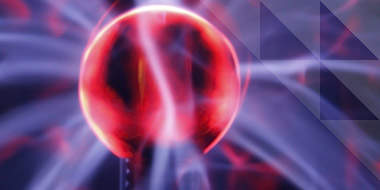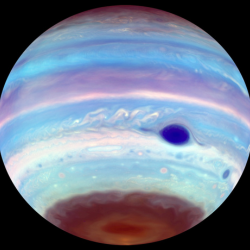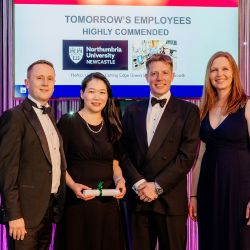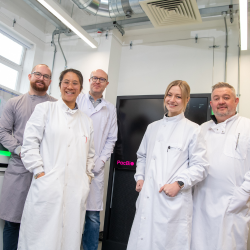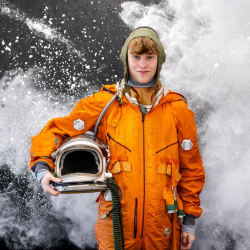Dispersive hydrodynamics
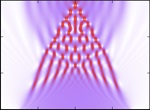
Dispersive hydrodynamics has emerged as a unified mathematical framework for the description of multiscale nonlinear wave phenomena in dispersive media, encompassing both dynamic and stochastic aspects of wave propagation. Recent theoretical and experimental developments have opened up new areas for research, with intriguing open issues in both theory and applications. These include the understanding of fundamental regularisation mechanisms of hydrodynamic singularities via the generation of dispersive shock waves (DSWs) and related phenomena. Physical examples of dispersive hydrodynamic phenomena include undular bores on rivers, in the ocean and atmosphere, nonlinear diffraction patterns in optics and quantum fluids, turbulence in fibre lasers and superfluids.
The dispersive hydrodynamics research in the MCNP group is centred around four major themes:
- Dispersive shock waves in integrable and non-integrable systems
- Integrable turbulence and soliton gas
- Extreme nonlinear wave phenomena
- Physical applications in fluid mechanics and nonlinear optics
The mathematics employed involve a synthesis of exact and asymptotic methods from soliton theory, hyperbolic conservation laws and Whitham modulation theory. The analytical developments are supported by careful numerical simulations and, when possible, comparisons with available experimental and observational data.
Lead by: Gennady El
Key publications:
- G. A. El and A. Tovbis, arXiv:1910.05732 (2019)
- M. D. Maiden, D. V. Anderson, N. A. Franco, G. A. El, and M. A. Hoefer, Phys. Rev. Lett. 120, 144101 (2018)
- G. A. El and M. A. Hoefer, Physica D 33, 11-65 (2016)
- G. A. El, E. G. Khamis, and A. Tovbis, Nonlinearity 29, 2798-2836 (2016)
Funding: EPSRC (2017-2010, Grant No. EP/R00515X/1); Dstl (2017-2020, Contract No DSTLX-1000116851); LumOptica (2019-2020, Contract Research Grant), the London Mathematical Society Research in Pairs Grants (2014, 2015, 2017, 2018, 2019), the Royal Society International Exchanges Scheme (2014-2016).
Integrability and Complexity
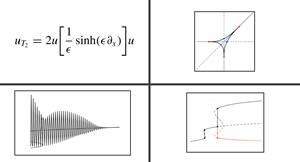
Integrability and Complexity are often viewed as antinomic concepts. The notion of Integrability is associated to systems that exhibit some form of regularity and therefore are "simple enough" to be solved analytically. The idea of Complexity arises in a variety of contexts where a system shows features such as chaos, disorder, instability, randomness.
The modern theory of integrable systems demonstrates that it is indeed possible to use analytical techniques to capture and describe complex behaviours in nonlinear and many-body systems.
The research focuses on the method of differential identities as a unified approach to the solution of a general class of statistical mechanical systems, from classical "simple" systems, which exhibit Ising type phase transitions, to systems where complex behaviours emerge. Key features of a variety statistical mechanical models, e.g. critical and collective behaviours, scaling properties, can be understood and explained in terms of scaling properties and regularisation mechanisms of singularities of nonlinear integrable systems.
Main research topics are:
- Partition functions of statistical mechanical systems, random graph and random matrix models.
- Singular limits of nonlinear integrable partial differential equations and multiscale asymptotics.
- Classical and dispersive shocks of order parameters.
- Classification of nonlinear integrable partial differential equations and normal forms.
Lead by: Antonio Moro
Key publications:
- C. Benassi and A. Moro, Phys. Rev. E 101, 052118 (2020)
- G. De Matteis, F. Giglio, and A. Moro, Annals of Physics 396 386-396 (2018)
- B. Dubrovin, T. Grava, C. Klein, and A. Moro, J. Nonlinear Sci., 25 631-707 (2015)
- A. Moro, Annals of Physics. 343 49-60 (2014)
Funding: Leverhulme Trust Research Project Grant (2018-2021, PI: A. Moro; Grant Ref. RPG-2017-228) - Dressing methods and complexity reduction for integrable networks models; Royal Society International Exchanges (2017-2019) - PI: A. Moro; Co-I: G. Biondini - p-Stars and KP: soliton phase diagrams for complex systems.
Classical-to-quantum correspondence for many-body systems
This research aims to understand the transition from a classical system to its quantum analogue. This fundamental research domain, sometimes dubbed 'quantum chaos', has had numerous connections ranging from physics (nuclear physics, microwave cavities, transport in quantum dots) to mathematics (number theory, spectral theory, dynamical systems). In the physics community, there has been recently a renewed attention to apply these techniques for quantum systems composed of interacting particles, under the name of 'many-body quantum chaos'. I am interested in the more fundamental questions, which are raised when studying a quantum many-body system/model using a semiclassical perspective.
Lead by: Rémy Dubertrand
Key publications:
- R. Dubertrand and S. Müller, New J. Phys. 18, 033009 (2016)
- I. García-Mata, O. Giraud, B. Georgeot, J. Martin, R. Dubertrand, and G. Lemarié, Phys. Rev. Lett. 118, 166801 (2017)
Metamaterials and geophysics dynamics
- Nonlinear waves in optical and mechanical topological insulators
- Localized pattern formation in driven dissipative systems
- Mathematical models of meltwater features in cold environments
Lead by: Yiping Ma
Key publications:
- D. D. J. M. Snee and Y.-P. Ma, Ext. Mech. Lett. 30, 100487 (2019)
- Y.-P. Ma, I. Sudakov, C. Strong, and K. M. Golden, New J. Phys. 21, 1367-2630 (2019)
- Y.-P. Ma and E. Knobloch, Physica D 337, 1-17 (2016)
Modulation of nonlinear waves and dispersive shock waves
The Whitham modulation theory describes intermediate and long-time dispersive hydrodynamics, and has proved particularly effective in the determination of nonlinear waves such as the celebrated dispersive shock wave (DSW) solution. My research explores new developments and applications of the modulation theory, with the description of:
- DSWs in non-integrable systems (e.g. Serre fully nonlinear shallow water equations)
- New wave structures in systems with nonconvex dispersion (e.g. Benjamin-Bona-Mahony equation)
- Interactions between nonlinear waves within the framework of wave-mean flow interaction
Lead by: Thibault Congy
Key publications:
- T. Congy, G. A. El, and M. A. Hoefer, J. Fluid Mech. 875, 1145-1174 (2019)
- T. Congy, G. A. El, M. A. Hoefer, and M. Shearer, Stud. Appl. Math. 142, 241-268 (2019)
- S. K. Ivanov, A. M. Kamchatnov, T. Congy, and N. Pavloff, Phys. Rev. E 96, 062202 (2017)
Nonlinear dynamics in delayed feedback systems
Cyclic rhythms are crucial for the proper functioning and robustness of many biological systems. These are often described using nonlinear differential equations which incorporate feedback mechanisms with inherent delays of various types. The characterisation of periodic solutions in such systems provides markers of accuracy for these rhythms as well as pathways for restoring them. A particular emphasis given to the glucose-insulin regulation system.
Lead by: Benoit Huard
Key publications:
- A. Bridgewater, B. Huard, and M. Angelova, J. Nonlinear Sci. 30, 737-766 (2020)
- B. Huard, A. Bridgewater, and M. Angelova, J. Theor. Biol. 418, 66 - 76 (2017)
- B. Huard, M. Angelova, and J. Easton, Commun. Nonlinear Sci. 26, 211 - 222 (2015)
Funding: Newton Advanced fellowship from the British Academy of Sciences.
Nonlinear waves and complex dynamics
- Nonlinear waves in ferromagnetic systems: Localised, propagating magnetic structures in 1- and 2-dimensional ferromagnetic systems at the nanometre length-scale. Classical, continuous Heisenberg ferromagnet equation. Landau-Lifshitz equation with uni-axial and bi-axial anisotropy.
- Integrability and linear stability of nonlinear waves: Linear stability analysis of scalar and multi-component, nonlinear partial differential equations of integrable type. Manakov system. Vector nonlinear Schrödinger equation. Three waves resonant interaction equation.
- Complex dynamics and Riemann surfaces: Understanding complex dynamics by means of an associated Riemann surface. Circular flow on a compact Riemann surface. Landen transformations. Slow chaos and parabolic dynamical systems.
Lead by: Matteo Sommacal
Funding: LMS, Research in Pairs - Scheme 4, "Instabilities of nonlinear waves by means of elementary algebraic-geometry", Grant Ref. 41808 (2019). LMS, Research in Pairs - Scheme 4, "Propagating, localised waves in ferromagnetic nanowires", Grant Ref. 41622 (2017).
Phase transitions in spin systems and random matrix models
Statistical mechanics is the field of mathematical physics describing the collective behaviour of macroscopic systems from the aggregated features of their microscopic components. A typical phenomenon observed in this context in various physical models is phase transitions, an abrupt change in the qualitative features of the system when its parameters (e.g. temperature, magnetic field) are tuned. In my research I focus on the investigation of phase transitions in various models, specifically lattice spin systems and random matrix models. Lattice spin systems provide a simplified description of the magnetic behaviour of solid materials, and some of them can be investigated using their relationship with a class of probabilistic models describing interacting random loops. Random matrix models present very distinctive phase transitions, and can be explored exploiting their underlying integrable structure and the tools provided by dispersive hydrodynamics.
Lead by: Costanza Benassi
Key publications:
- C. Benassi and A. Moro, Phys. Rev. E 101, 052118 (2020)
- C. Benassi and D.Ueltschi, Commun. Math. Phys. doi:10.1007/s00220-019-03474-9 (2019)
- C. Benassi, J. Fröhlich, and D. Ueltschi, Ann. Henri Poincaré 18, 2831-2847 (2017)







